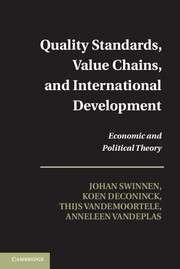Book contents
- Frontmatter
- Contents
- Preface and Acknowledgments
- 1 Introduction
- 2 Modeling Standards
- 3 Efficiency and Equity Effects of Standards
- 4 The Political Economy of Standards and Development
- 5 International Trade and Standards
- 6 Risk, Externalities, and the Nature of Standards
- 7 Endogenous Private and Public Standards in Value Chains
- 8 Butterflies and Political Economy Dynamics in Standard Setting
- 9 The Political Economy of Standards and Inclusion in Value Chains
- 10 Standards, Production Structure, and Inclusion in Value Chains
- 11 Standards, Market Imperfections, and Vertical Coordination in Value Chains
- 12 Market Power and Vertical Coordination in Value Chains
- 13 Price Transmission in Value Chains
- 14 Commodity Characteristics and Value Chain Governance
- 15 Economic Liberalization, Value Chains, and Development
- 16 Standards and Value Chains with Contracting Costs: Toward a General Model
- 17 General Equilibrium Effects of Standards in Value Chains
- References
- Index
7 - Endogenous Private and Public Standards in Value Chains
Published online by Cambridge University Press: 05 August 2015
- Frontmatter
- Contents
- Preface and Acknowledgments
- 1 Introduction
- 2 Modeling Standards
- 3 Efficiency and Equity Effects of Standards
- 4 The Political Economy of Standards and Development
- 5 International Trade and Standards
- 6 Risk, Externalities, and the Nature of Standards
- 7 Endogenous Private and Public Standards in Value Chains
- 8 Butterflies and Political Economy Dynamics in Standard Setting
- 9 The Political Economy of Standards and Inclusion in Value Chains
- 10 Standards, Production Structure, and Inclusion in Value Chains
- 11 Standards, Market Imperfections, and Vertical Coordination in Value Chains
- 12 Market Power and Vertical Coordination in Value Chains
- 13 Price Transmission in Value Chains
- 14 Commodity Characteristics and Value Chain Governance
- 15 Economic Liberalization, Value Chains, and Development
- 16 Standards and Value Chains with Contracting Costs: Toward a General Model
- 17 General Equilibrium Effects of Standards in Value Chains
- References
- Index
Summary
Introduction
Chapters 4 to 6 developed a political economy approach to explaining public standard setting. An implicit assumption in those chapters is that private firms are unable to credibly communicate the quality characteristics of products, so that the market was governed only by public standards. However, private standards, introduced by private companies, are increasingly important in the global market system (Fulponi, 2007; Henson, 2004; Henson and Hooker, 2001). Retailers and producers often introduce private standards in the same domains as in which the government imposes public standards, such as safety, quality, and social and environmental aspects of production, retail, and consumption.
The literature provides several explanations why companies may impose private standards in the absence and in the presence of public standards (see Section 7.2 for a review). However, the explanations in the literature do not explain well why companies may set private standards significantly higher than public standards but not very different from their competitors. Yet this is what is observed in reality, for example, in rapidly spreading standards such as GLOBALG.A.P. (see later).
To explain this we extend the model of Chapter 4 to incorporate a richer value chain structure. More specifically, in our analyses in this book so far, like in most of the literature, we considered two-agent models with “producers” and “consumers.” However, focusing only on these two groups ignores important structural features of modern value chains. The “producer” side of the value chain is often characterized by a large number of small “producers” (such as farms) and a few companies (such as processing companies or retail chains) which sell products to consumers and often exercise market power (Sexton et al. 2007). In reality, many private standards are set by retailers – not by producers. Therefore we explicitly introduce a monopolist retailer that may set a private standard to regulate the same product characteristics as the government's public standard and show that this has important consequences for the analysis of private standards. In addition to the retailer's private standard, we assume there is a public standard that is determined in a political game in which producers and the retailer have political power to influence the government's standard-setting process.
Our analysis shows that if the retailer can impose most of the costs of a higher standard on producers, the optimal retailer standard will be higher than the optimal standard for producers.
- Type
- Chapter
- Information
- Quality Standards, Value Chains, and International DevelopmentEconomic and Political Theory, pp. 76 - 96Publisher: Cambridge University PressPrint publication year: 2015



